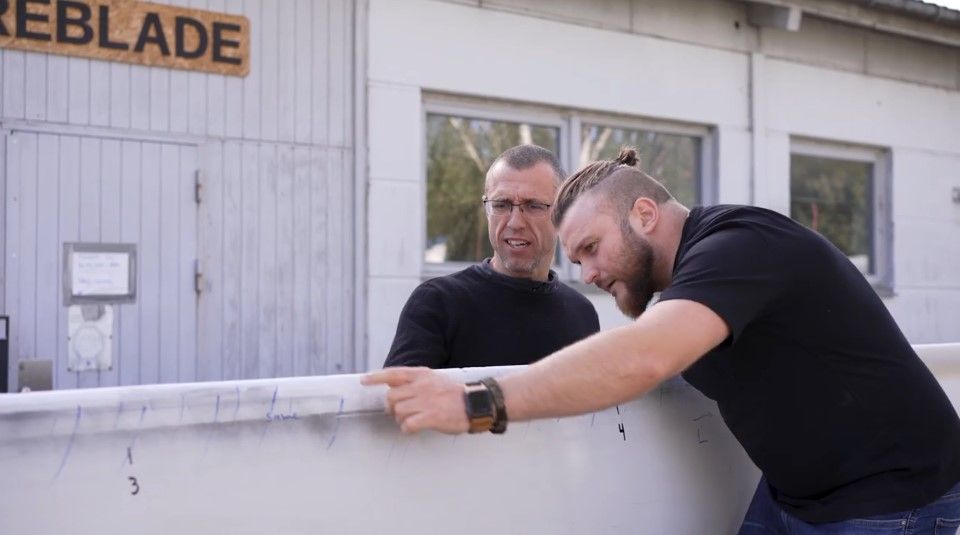Danish AI cuts wind turbine downtime

When a wind turbine blade needs repairing, two specialists – known as rope technicians – must climb 130 metres up inside the turbine tower and out through a hatch before lowering themselves down to the blade on a rope while carrying tools and materials.
It is a dangerous and time-consuming job, especially when there is a lot of wind – which is often the case where wind turbines are located. There is also a shortage of rope technicians. That is why Danish startup Reblade has used AI to develop robot and drone technology, making it possible to land very precisely on turbine blades even in heavy winds.
The drone can then quickly find and repair the categories of surface erosion damage that most often appears on blades, cutting wind turbine repair downtime.
“Our solution cuts the wind turbine’s downtime by 90 per cent, because the drone and the robot technology speeds up repairs and because the wind turbine operator does not have to wait for a rope technician to become available. There is a global shortage of rope technicians,” explains Reblade co-founder and CEO Frank Kjerstein.
AI secures safe drone landing
You need a special mindset and a lot of experience to hang from a rope at great heights for 10 to 12 hours at a time while fixing a wind turbine blade. Many rope technicians want to carry out different tasks when they get older. As a result, there is only a small group of experts who cannot keep up with demand, says Frank Kjerstein.
This was the challenge he and his partner André Alexander Westergaard decided to take on when they founded Reblade together in 2020.
“There were already alternatives to rope technicians, including a large robot weighing 180 kilos that also hangs from a rope. But we have developed a lightweight drone that can fly up and land exactly where the repair is needed. We use AI to make it precise enough.”
Thanks to AI technology, Reblade’s drones can carry out precision landings no matter how strong the wind, weekdays and weekends, and the drone does not get tired or make mistakes.
Reblade’s drones and robot technology have been made to proactively repair damage to the leading edge of wind turbine blades and to fix three out of five categories of wear on the blades.
Rope technicians are still needed for the other two categories of blade erosion, so the drones are not putting them out of a job. They are still needed to carry out a range of tasks, underlines Frank Kjerstein.
“Ours is also a green solution. We help increase the production of green energy and to reach the aims of the green transition, thanks to fewer days of turbine downtime.”
AI attracts specialists
The company develops and builds the drones in the town of Mørke in Jutland, and has had no problem attracting specialised labour. Reblade today employs 15 people from around the world, most of them engineers with AI knowledge.
“Attracting and retaining highly specialised labour is a challenge for many Danish companies, but not for us – despite being a small startup without a well-known brand, situated in a small town in Jutland.”
Reblade raised their profile after winning the Danish Industry Foundation's AI prize worth €27.000. Photo: AI Denmark.
Reblade has seen how AI has become a magnet for international experts.
“When we advertise new positions, we get many applications from the best people in the world. They want to work in a technologically exciting company, and the fact that we develop drones and use AI solutions in a complex high-tech system provides completely different recruitment opportunities.
“Our flat organisational structure and quick decision-making that allows each of us to make an individual impact every day, is also very appealing.
AI is only a small part of Reblade’s drone technology, but having AI as part of the job description is clearly an asset, believes Frank Kjerstein.
Employees in companies that only develop software can often work from home or from a completely different part of the world. Reblade’s engineers physically work with the drones, so they have to be in the workplace. This means employees move to Denmark from around the world.
Reblade employs people from many countries, including Ukraine, India, Malaysia, Russia, Mexico, Pakistan and Egypt.
AI helps recruitment
Nearly all the employees are different types of engineers. Most are mechanical engineers, but there are also robotics engineers, software engineers and control engineers. Most of them have comprehensive knowledge of AI.
Reblade also uses AI in recruitment, says Frank Kjerstein.
“We typically get 70 applications for each job. Using AI, we have created an employment platform allowing the applicants to interview themselves on video which AI then turns into a text that we can read through to efficiently pick the best candidates. Based on the AI-generated transcript, we choose the videos that are most relevant for in-depth assessment and only watch these.”
The highest-qualified and most relevant candidates are then given some professional tasks to solve.
Small and medium-sized Danish companies are generally lagging behind in their use of AI, and many struggle to attract specialists. Frank Kjerstein therefore advises all to get on the AI train, also to improve their chances to recruit the right specialists.
A changing labour market
Just five per cent of small and medium-sized companies in Denmark use AI, according to a 2019 report from McKinsey and the Innovation Fund Denmark. It predicts that AI will lead to major changes in the Danish labour market and that there will be a major shortfall of specialists with sufficient special skills to exploit the big potential of AI.
The report says several Danish universities excel in AI research and help advise Danish companies. One of these is Aalborg University, which has advised Reblade on AI use in drones.
Reblade is one of 120 companies that have been offered a specific development and implementation programme in collaboration with a university.


